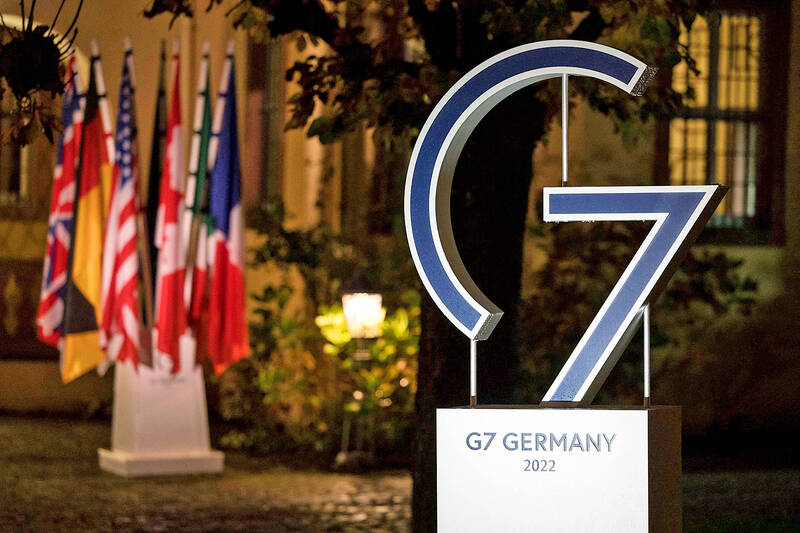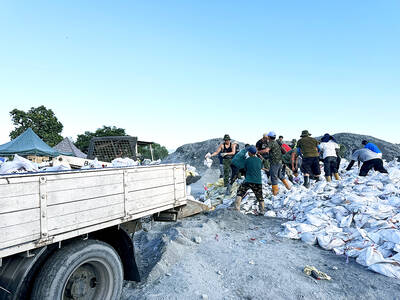The G7 should not shrink from making explicit plans to deter military action or other coercive measures Beijing might contemplate taking against Taiwan, the Inter-Parliamentary Alliance on China (IPAC) said in a statement on Monday.
The communique of the international consortium should “not shy away from the need for coordinated deterrence,” it said, adding that the group must make clear that “escalated aggression against Taiwan will cost Beijing dearly.”
Lawmakers from Australia, Canada, the Czech Republic, Estonia, Japan, the Netherlands, Ukraine and the UK were among the IPAC members who signed the statement.

Photo: AFP
The G7 should reassert its “firm opposition to any unilateral change” to the “status quo” across the Taiwan Strait, emphasize Taiwan’s importance to the global economy and deter Beijing from belligerent actions, it said.
The international body should acknowledge that instability in the South China Sea would have a significantly negative effect on the world economy and ensure that efforts to de-risk the global supply chain take the situation in the region into account, it said.
The G7 was additionally called upon to reduce overdependency on China, increase supply chain and energy resilience, improve labor standards, counter cybersecurity threats, cybertheft and disinformation, and oppose “transnational repression” emanating from China, the group said.
“G7 countries [should] coordinate their efforts to investigate and expose China’s transnational repression, including by sharing information, coordinating sanctions, and supporting civil society groups and human rights defenders who are working to document and counter these abuses,” it said.
The G7 was called upon to “work with other like-minded partners to pressure China to end its transnational repression by raising these issues in multilateral fora,” IPAC said.
Beijing’s “no limits” friendship with Moscow amid Russian President Vladimir Putin’s invasion of Ukraine cast doubt on China’s commitment to “the foundational principles of the international rules-based system,” it said.
Chinese entities and individuals should be monitored for providing aid to Russian aggression and sanctions invoked if necessary, it added.

Taipei, New Taipei City, Keelung and Taoyuan would issue a decision at 8pm on whether to cancel work and school tomorrow due to forecasted heavy rain, Keelung Mayor Hsieh Kuo-liang (謝國樑) said today. Hsieh told reporters that absent some pressing reason, the four northern cities would announce the decision jointly at 8pm. Keelung is expected to receive between 300mm and 490mm of rain in the period from 2pm today through 2pm tomorrow, Central Weather Administration data showed. Keelung City Government regulations stipulate that school and work can be canceled if rain totals in mountainous or low-elevation areas are forecast to exceed 350mm in

EVA Airways president Sun Chia-ming (孫嘉明) and other senior executives yesterday bowed in apology over the death of a flight attendant, saying the company has begun improving its health-reporting, review and work coordination mechanisms. “We promise to handle this matter with the utmost responsibility to ensure safer and healthier working conditions for all EVA Air employees,” Sun said. The flight attendant, a woman surnamed Sun (孫), died on Friday last week of undisclosed causes shortly after returning from a work assignment in Milan, Italy, the airline said. Chinese-language media reported that the woman fell ill working on a Taipei-to-Milan flight on Sept. 22

The Central Emergency Operations Center (CEOC) has made a three-phased compulsory evacuation plan for Hualien County’s Mataian River (馬太鞍溪) disaster zone ahead of the potential formation of a typhoon. The plan includes mandatory vertical evacuation using air-raid-style alarms if needed, CEOC chief coordinator Chi Lien-cheng (季連成) told a news conference in the county yesterday. Volunteers would be prohibited from entering the disaster area starting tomorrow, the retired general said. The first phase would be relocating vulnerable residents, including elderly people, disabled people, pregnant women and dialysis patients, in shelters and hospitals, he said. The second phase would be mandatory evacuation of residents living in

COUNTERMEASURE: Taiwan was to implement controls for 47 tech products bound for South Africa after the latter downgraded and renamed Taipei’s ‘de facto’ offices The Ministry of Foreign Affairs is still reviewing a new agreement proposed by the South African government last month to regulate the status of reciprocal representative offices, Minister of Foreign Affairs Lin Chia-lung (林佳龍) said yesterday. Asked about the latest developments in a year-long controversy over Taiwan’s de facto representative office in South Africa, Lin during a legislative session said that the ministry was consulting with legal experts on the proposed new agreement. While the new proposal offers Taiwan greater flexibility, the ministry does not find it acceptable, Lin said without elaborating. The ministry is still open to resuming retaliatory measures against South